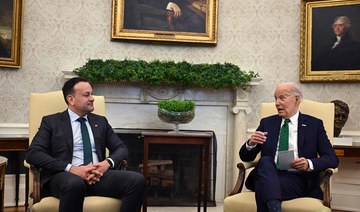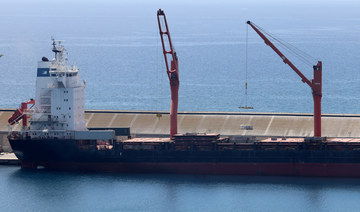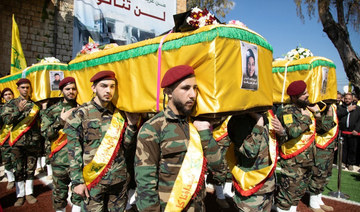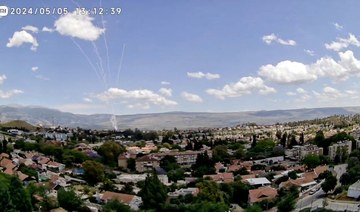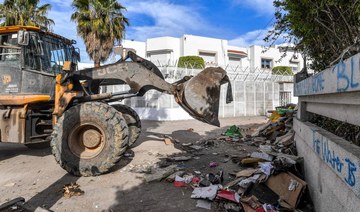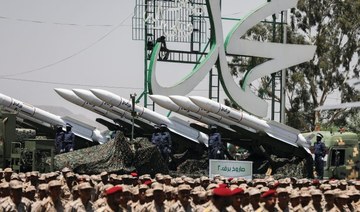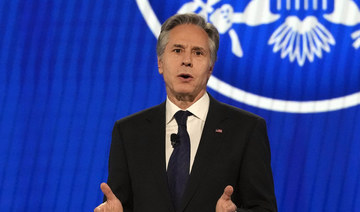WASHINGTON: US President Joe Biden told Israeli Prime Minister Benjamin Netanyahu Monday that a major ground offensive in Gaza’s Rafah would be a “mistake,” as the two leaders spoke for the first time in a month amid growing tensions.
Netanyahu had also agreed to Biden’s request to send a delegation of senior Israeli officials to Washington to discuss Israel’s Rafah plans and a possible “alternative approach,” the White House said.
But in a sign of the increasingly difficult relationship, Netanyahu said that he had insisted to Biden on achieving all of Israel’s war aims against Hamas.
The pair last spoke on February 15, and Biden has been increasingly vocal in his criticisms of the Palestinian death toll and dire humanitarian situation in Gaza where the UN has warned of famine.
Biden was caught on a hot mic moment recently saying that he would have a “come to Jesus meeting” with the Israeli premier as his frustration grew with Netanyahu.
“The president explained why he is so deeply concerned about the prospect of Israel conducting major military operations in Rafah,” US National Security Adviser Jake Sullivan told a briefing Monday.
“A major ground operation there would be a mistake, it would lead to more innocent civilian deaths, worsen the already dire humanitarian crisis, deepen the anarchy in Gaza, and further isolate Israel internationally,” said Sullivan.
Biden had asked Netanyahu to send a senior team of military, intelligence and aid officials to Washington to “hear US concerns” about the current Rafah plan — and discuss an “alternative approach” involving targeted raids on Hamas.
Netanyahu agreed to “have this discussion and this engagement,” Sullivan said.
Sullivan described the call as “businesslike.” Explaining why the two leaders had not spoken for 32 days, Sullivan said Biden reserves his calls for Netanyahu for “when he believes there is a key strategic moment.”
Biden has stood by Israel since the October 7 attacks, visiting the country shortly afterwards, and the United States has continued to supply its key ally with billions of dollars in aid.
But Biden has been increasingly vocal in his criticisms of the Palestinian death toll and dire humanitarian situation in Gaza. Democrats fear growing opposition at home could hurt his chances in November’s presidential election.
Netanyahu said in a statement after the call that he had reiterated “Israel’s commitment to achieving all of the war’s objectives.”
The Israeli premier cited the objectives as eliminating Hamas, release of all the hostages and “ensuring that Gaza will never present a threat to Israel.”
He also pointed to the provision of “essential humanitarian aid that helps achieve these aims.”
Israel began relentless bombardment in Gaza, alongside a ground offensive, after Palestinian militant group Hamas’s unprecedented October 7 attack, which left about 1,160 dead in Israel, mostly civilians, according to an AFP tally of official figures.
The militants also seized hostages, around 130 of whom Israel believes remain in Gaza, including 33 presumed dead.
Nearly 32,000 people have been killed in Gaza since the war began, most of them women and children, according to the health ministry in the Hamas-run territory.
As tensions with Netanyahu escalated, Biden pointedly praised a “good speech” last week by Democratic Senate Majority Leader Chuck Schumer calling for new elections in Israel.
With the UN warning of imminent famine in Gaza, Biden earlier this month ordered the US military to start airdrops of food into the enclave, and is sending American forces to build a temporary port for maritime aid.
Biden tells Netanyahu Rafah operation would be ‘mistake’
https://arab.news/n6h65
Biden tells Netanyahu Rafah operation would be ‘mistake’
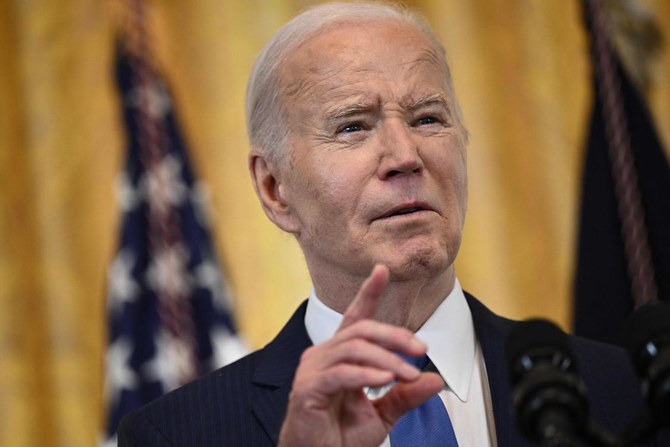
- Biden has been increasingly vocal in his criticisms of the Palestinian death toll and dire humanitarian situation in Gaza where the UN has warned of famine
- Biden pointedly praised a ‘good speech’ last week by Democratic Senate Majority Leader Chuck Schumer calling for new elections in Israel
First shipment of aid to the US-built floating pier in Gaza departs from Cyprus
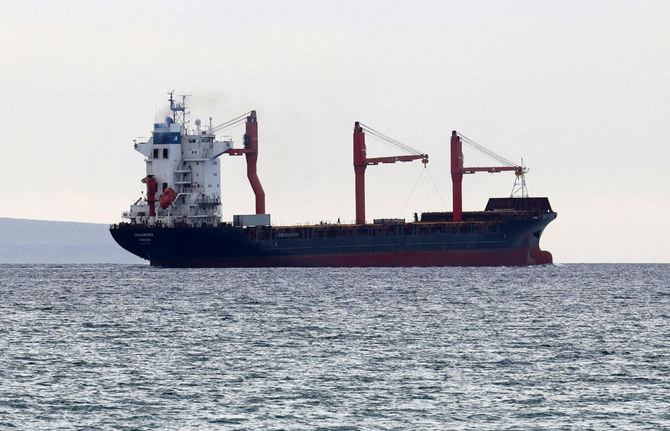
- The US vessel, loaded with much needed humanitarian assistance, departed from the Larnaca port
NICOSIA, Cyprus: A shipment of humanitarian aid has left a port in Cyprus and is on its way to the US-built pier in Gaza, the first delivery to the newly built ramp, Cyprus’ foreign minister said Thursday.
The US vessel, loaded with much needed humanitarian assistance, departed from the Larnaca port with the aim of transferring as much aid to Gaza as possible through the maritime corridor, said Foreign Minister Constantinos Kombos.
The trip comes some two months after US President Joe Biden gave the order to build the large floating platform several miles off the Gaza coast that will be the launching pad for deliveries.
The relief is desperately needed, with the United Nations saying people in Gaza are on the brink of famine and as Israeli troops ordered the evacuation of 100,000 Palestinians from Gaza’s southern city of Rafah.
Earlier this week, Israel sent tanks to seize the nearby Rafah crossing with Egypt, shutting down a vital crossing needed to get assistance into the battered enclave.
It remains uncertain whether Israel will launch an all-out invasion of Rafah as international efforts for a ceasefire continue. Israel has said an assault on Rafah is crucial to its goal of destroying Hamas after the militant group’s Oct. 7 attack on southern Israel that left 1,200 dead and 250 as hostages in Gaza.
The United States, which opposes a Rafah invasion, has said Israel has not provided a credible plan for evacuating and protecting civilians. The war has killed over 34,800 Palestinians, according to Gaza health officials, and has driven some 80 percent of Gaza’s population of 2.3 million Palestinians from their homes.
Humanitarians said aid coming by sea won’t be enough to alleviate the dire humanitarian suffering in Gaza and that the most effective way to get assistance in is by land.
The closure of the Rafah crossing and the nearby Kerem Shalom crossing this week cut off the entry of food, supplies, and fuel for aid trucks and generators. Aid groups warn they have only a few days of fuel before humanitarian operations and hospitals around Gaza begin to shut down.
Israel said Wednesday it reopened Kerem Shalom, which was shut after Hamas mortars killed four Israeli soldiers nearby, but aid groups said no trucks were entering the Gaza side.
Trucks let through from Israel must be unloaded and the cargo reloaded onto trucks in Gaza, but no workers in Gaza can get to the facility to do so because it is too dangerous, the UN says.
Israeli strike on Lebanon kills four Hezbollah fighters, security sources say
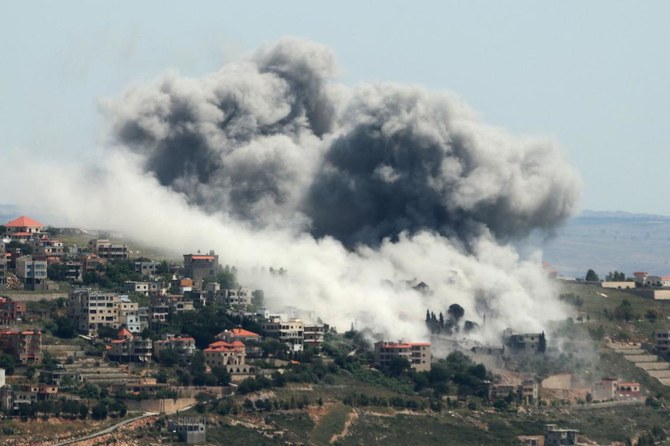
- Israeli military did not immediately comment on Thursday’s strikes
- Lebanon’s civil defense rescue force said it had pulled four bodies out of a car that had been scorched by an Israeli strike
BEIRUT: An Israeli air strike on a car in southern Lebanon killed four people on Thursday, according to Lebanon’s civil defense, with security sources saying those killed were members of armed group Hezbollah.
The conflict between Hezbollah and Israel has rumbled on since October in parallel to the Gaza war, with an escalation this week as both sides intensified their bombardment, fueling concern of a bigger war between the heavily-armed adversaries.
Israel has used artillery, drones and warplanes against targets in southern Lebanon, including to strike fighters from Hezbollah and other armed groups. Fighters in Lebanon have launched rockets and their own drones into northern Israel.
The Israeli military did not immediately reply to a request for comment on Thursday’s strikes.
Lebanon’s civil defense rescue force said it had pulled four bodies out of a car that had been scorched by an Israeli strike. Two security sources told Reuters the four killed were members of Hezbollah.
The exchanges of fire have uprooted tens of thousands of people on both sides of the border. In northern Israel, the displacement has prompted calls for firmer military action against Hezbollah.
Israeli Defense Minister Yoav Gallant warned on Wednesday that the next months “may be a hot summer,” saying either a diplomatic deal or military solution was needed to restore security.
The fighting between Israel and Hezbollah has been the most intense since they went to war in 2006.
Hezbollah has repeatedly said that it will cease fire when the Israeli offensive in Gaza stops, but that it is also ready to fight on if Israel continues to attack Lebanon.
Activist in Tunisia arrested as conditions for migrants and their advocates worsen
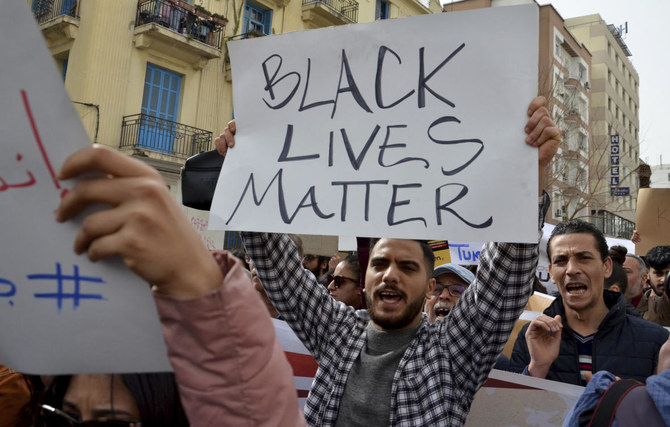
- Saadia Mosbah, who is Black, was taken into custody and her home was searched
- She was arrested after she posted on social media condemning the racism she faced
TUNIS, Tunisia: An anti-discrimination activist in Tunisia was arrested in a money laundering investigation this week as the dangerous and dire conditions facing migrants and their advocates worsen.
Saadia Mosbah, who is Black, was taken into custody and her home was searched as part of an investigation into the funding for the Mnemty association she runs.
She was arrested after she posted on social media condemning the racism she faced for her work from people accusing her of helping sub-Saharan African migrants, said Bassem Trifi, the president of the Tunisian League for the Defense of Human Rights.
Her arrest was the latest reflection of the problems facing migrants in Tunisia as authorities bolster efforts to police the shoreline where many embark on boats hoping to reach Europe.
In a national security council meeting focused on irregular migration, Tunisian President Kais Saied said Tuesday that associations that receive substantial foreign funds were “traitors and agents” and shouldn’t supplant the state’s role in managing migration and fighting human trafficking.
Fewer migrants have made the dangerous journey across the Mediterranean Sea this year due to weather and beefed-up border security. But human rights groups caution that efforts to curb crossings haven’t protected the tens of thousands of migrants stuck in Tunisia.
More than 80 migrants were arrested in Tunis last week after clashes with law enforcement as they cleared encampments in the capital that were “disturbing the peace,” according to Tunisia’s Radio Mosaique.
Hundreds of migrants had camped near the headquarters of the UN refugee agency and International Organization for Migration, often demanding the agencies repatriate them outside of Tunisia. Law enforcement used heavy machinery to raze their tents and then bused them outside of the city to “an unknown destination,” said Romdhane Ben Amor, a spokesman for the Tunisian Forum for Economic and Social Rights.
“Tunisia is deepening the crisis and promoting the idea that there is no solution,” Ben Amor told Radio Mosaique.
An estimated 244 migrants — most of them from outside Tunisia — have died or disappeared along the country’s Mediterranean coastline this year, including 24 whose bodies were found last week, the NGO said.
In a report based on government data released Monday, it noted that the number of migrants without papers boating across the Mediterranean had decreased as Tunisian authorities report an increasing number of interceptions. Such is the case for both migrants from Tunisia and migrants passing through the country en route to Europe.
In April, authorities directly thwarted 209 migration attempts and in total prevented more than 8,200 migrants from reaching Italy, the majority from sub-Saharan African countries. Tunisian Coast Guard have prevented more than 21,000 migrants from reaching Italy this year.
Managing migration to prevent scenes of chaos and despair along Italian shorelines has been a top priority for European leaders, including Italian Premier Giorgia Meloni, who has visited Tunis four times this year.
North African and European officials have sought to curb human trafficking and better police borders and coastlines to prevent deaths at sea. However, thousands of migrants fleeing conflict, poverty, persecution or hoping for a better life have continued to make the journey. They take boats from the coast north of Sfax, Tunisia’s second-largest city, to Italian islands such as Lampedusa, about 130 kilometers (81 miles) away.
The European Union hopes to limit migration with policies including development assistance, voluntary return and repatriation for migrants and forging closer ties with neighboring governments that police their borders. They have pledged billions of dollars over the past year to countries including Tunisia, Mauritania and Egypt to provide general government aid, migrant services and border patrols.
Though European leaders have hailed a $1.1 billion agreement with Tunisia as a template, Saied has pledged not to allow the country to become a “border guard” for Europe.
Less than one-third as many migrants have reached Italy in 2024 as had at this point last year, according to May 8 figures from Italy’s Interior Ministry. The UN refugee agency reported that more than 24,000 migrants traveled from Tunisia to Italy in the first four months of 2023 while less than 8,000 had successfully made the journey over the same time period this year.
Yemen’s Houthis say they targeted ships in Gulf of Aden, Indian Ocean
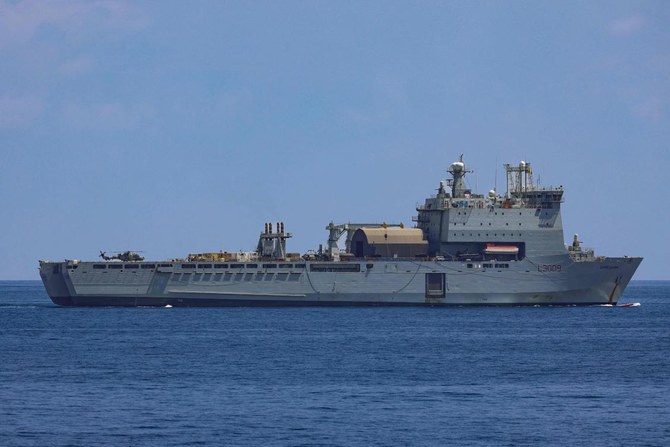
- The group also targeted the MSC VITTORIA in the Indian Ocean and again in the Gulf of Aden
DUBAI: Yemen’s Houthis on Thursday claimed two missile attacks in the Gulf of Aden on two Panama-flagged container ships that caused no damage, while also saying they targeted a ship in the Indian Ocean in a previously unreported assault.
The claims by Brig. Gen. Yahya Saree come as the tempo of the militia attacks have waned in recent weeks as they’ve been targeted by repeated airstrikes launched by a US-led coalition warship in waterways crucial to international trade. The Houthis insist their assaults will continue as long as Israel’s war on Hamas in the Gaza Strip goes on.
Saree in a prerecorded statement claimed attacks on the MSC Diego and MSC Gina. The Joint Maritime Information Center, a US-led coalition of nations operating in the Mideast, said those two missile attacks happened early Tuesday.
“Neither were hit and all crew on board are safe,” the center said. “The vessels were last reported proceeding to next port of call.”
The center added that the vessels were “likely targeted due to perceived Israeli affiliation.”
Both vessels were operating for Geneva-based Mediterranean Shipping Co., which did not immediately respond to a request for comment.
Saree did not say why it took the militia two day to claim the attacks. He also claimed the Houthis targeted the MSC Vittoria, another container ship, in the Indian Ocean. An attack on that vessel, however, has not been acknowledged by any authorities.
The Houthis say their attacks on shipping in the Red Sea and Gulf of Aden are aimed at pressuring Israel to end its war against Hamas in Gaza, which has killed more than 34,000 Palestinians there. The war began after Hamas-led militants attacked Israel on Oct. 7, killing 1,200 people and taking some 250 others hostage.
The Houthis have launched more than 50 attacks on shipping, seized one vessel and sunk another since November, according to the US Maritime Administration. Shipping through the Red Sea and Gulf of Aden has declined because of the threat.
Monitor, Iraqi group say Israel hits facilities in Syria
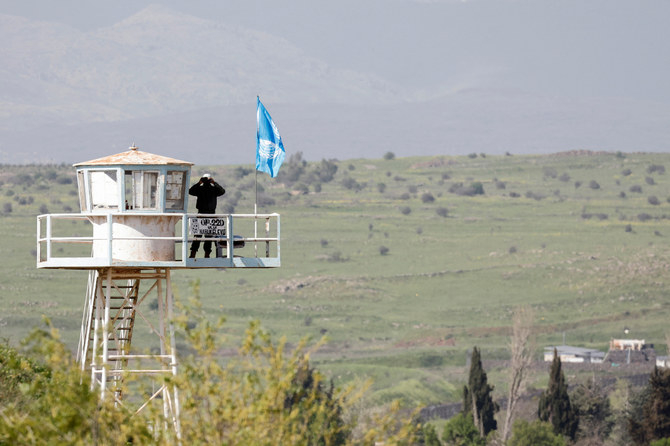
- The Syrian Observatory for Human Rights said “Israeli air strikes targeted a cultural center” and a “training facility” of the Iraqi Al-Nujaba movement
- Three members of the Iraqi group were wounded
BEIRUT: Israeli strikes on Syria early Thursday targeted facilities belonging to Iraq’s Al-Nujaba armed movement, a war monitor and the pro-Iran group said, with Damascus saying an unidentified building was attacked.
Israel has carried out hundreds of strikes in Syria since the outbreak of the civil war in its northern neighbor in 2011, mainly against army positions and Iran-backed fighters.
But the strikes increased after Israel’s war with Hamas in the Gaza Strip began on October 7, when the Iran-backed Palestinian militant group launched an unprecedented assault on Israel.
The Syrian Observatory for Human Rights said “Israeli air strikes targeted a cultural center” and a “training facility” of the Iraqi Al-Nujaba movement in the Sayyida Zeinab area south of Damascus.
Three members of the group were wounded according to the Britain-based Observatory, which relies on a network of sources inside Syria.
A source within the Iraqi faction, requesting anonymity as they were not authorized to speak to the media, confirmed that a “cultural center” belonging to the group was destroyed in the “Israeli” attack, but reported no casualties.
Al-Nujaba does “not have a declared military base in Syria,” the source added.
Syria’s defense ministry said that “at around 3:20 am today, the Israeli enemy launched an air attack from the direction of the occupied Syria Golan Heights targeting a building in the Damascus countryside.”
The attack caused “some material damage,” said the statement carried by state media, adding that air defense systems shot down some of the missiles.
The Sayyida Zeinab area is home to an important Shiite Muslim shrine that is protected by pro-Iran groups, including Lebanon’s Hezbollah, alongside the Syrian army, according to the Observatory.
The Al-Nujaba movement is part of a pro-Iran alliance in Iraq that Washington has blamed for numerous attacks on its forces.
Israel rarely comments on individual strikes on Syria, but has repeatedly said it will not allow its arch-enemy Iran to expand its presence there.
An April 1 raid blamed on Israel levelled Tehran’s consulate in Damascus and killed seven Iranian Revolutionary Guards, two of them generals.
That strike prompted Iran to launch a first-ever direct missile and drone attack against Israel on April 13-14 that sent regional tensions spiralling.




